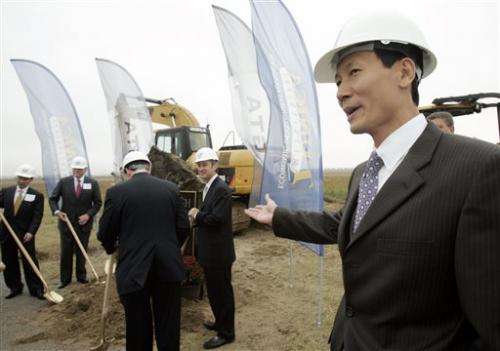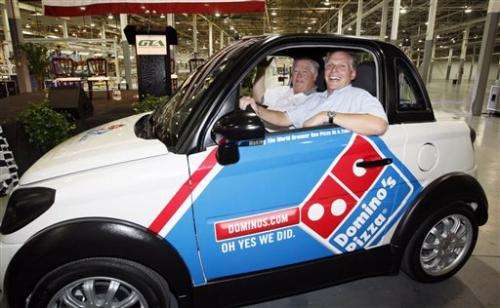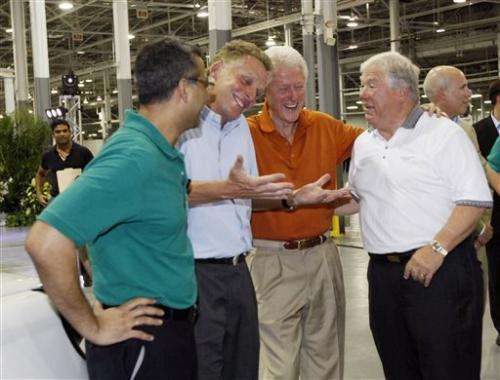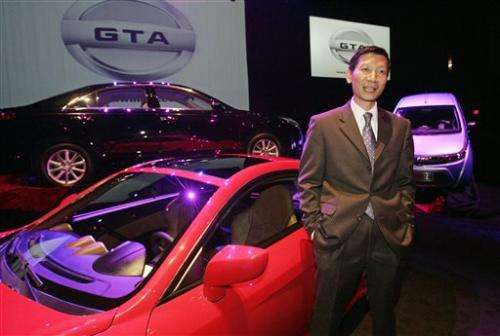Chinese businessman's plan produces few cars, jobs

In October 2009, GreenTech Automotive Inc.'s owner, Chinese businessman Xiaolin "Charles" Wang, unveiled four prototype cars during a flashy ceremony and promised to build a $2 billon plant in Mississippi, the poorest state in the U.S.
The company said production of fuel-efficient vehicles would start in three years, and foreign investors who paid at least $500,000 would get the chance to live in the United States. Meanwhile, the area would get desperately needed jobs and tax revenues.
But today, the company is under a federal investigation, and about the only thing on its land is a construction office. The company says it will be producing cars by April, but its plans have changed dramatically, from a goal of 250,000 a year to 30,000.
And the investigation is bringing scrutiny to a company run by the brother of former Secretary of State Hillary Rodham Clinton.
Some analysts say foreign investors may have been more interested in an easy way to get a U.S. visa and a chance at citizenship.
Besides backing from foreign investors, land was donated by Tunica County's economic development foundation, at a cost of $1.8 million, and in 2011 the state gave a $3 million loan. For a time, the company's chairman was Terry McAuliffe, a close adviser to former President Bill Clinton.
The cars were supposed to start rolling off the assembly line in 2012.
Instead, the company now uses a former elevator factory 30 miles (48 kilometers) away. A McAuliffe spokesman said about 100 small electric vehicles were built by the time McAuliffe resigned in December. The thousands of promised jobs have yet to materialize.
"It takes time to build a brand new company in a capital-intensive industry like electric vehicles, and we will not cut corners on quality or safety as we progress. We have a plan," GreenTech said in a statement. The company said it has more than 100 workers.

Some analysts say GreenTech exposes problems with a program used to attract foreign investors, known as the EB-5 visa program.
David North, a fellow with the nonprofit Center for Immigration Studies that examines immigration policies, said the foreign investors in the EB-5 program are primarily motivated by a desire to get green cards for them and their families.
Under the EB-5 visa program, foreigners can invest $500,000 or $1 million in American business ventures, depending on the location of the project. In GreenTech's case, the program called for $500,000 investments.

Under the rules of the program, each EB-5 investment must create at least 10 jobs. In exchange, the foreign investors get to stay in the United States for up to two years and can then apply for permanent U.S. residency. That's a faster process than for most other immigrants who must wait five years after establishing residency before being eligible for citizenship.
The EB-5 program is capped at 10,000 investors a year, and had 6,106 applicants in 2012.
The federal U.S. Citizenship and Immigration Services' Immigrant Investor Program also designates so-called "regional centers," companies that have authorization to handle the company's EB-5 investments.

In this case, Gulf Coast Funds Management—a company headed by Tony Rodham, Hillary Clinton's brother—is the designated "regional center" and has raised 45.5 million from foreign investors for GreenTech, according to an internal immigration services document obtained by The Associated Press.
Rodham has not responded to phone messages at Gulf Coast Funds or a message sent to an email address listed in government reports submitted to the government.
Of GreenTech's 91 foreign investors, only one has received permanent residency status, according to an internal immigration services document obtained by the AP that outlines background information about the firm. The name of the investor was not disclosed.

Christopher Bentley, spokesman for immigration services, said in an email he couldn't comment on details on the plans by GreenTech and Gulf Coast Funds.
In May, the Securities and Exchange Commission subpoenaed unspecified documents from GreenTech and banking records from Gulf Coast, according to nearly 100 pages of documents recently released by Sen. Charles Grassley.
The documents indicate GreenTech allegedly improperly guaranteed investors returns on their money. GreenTech has acknowledged receiving the subpoenas and said the company is cooperating with investigators.
It's not clear how many of the MyCars—which are not legal to drive on U.S. highways—have been sold.
GreenTech recently declined an AP request to tour its production facility.
© 2013 The Associated Press. All rights reserved.
















